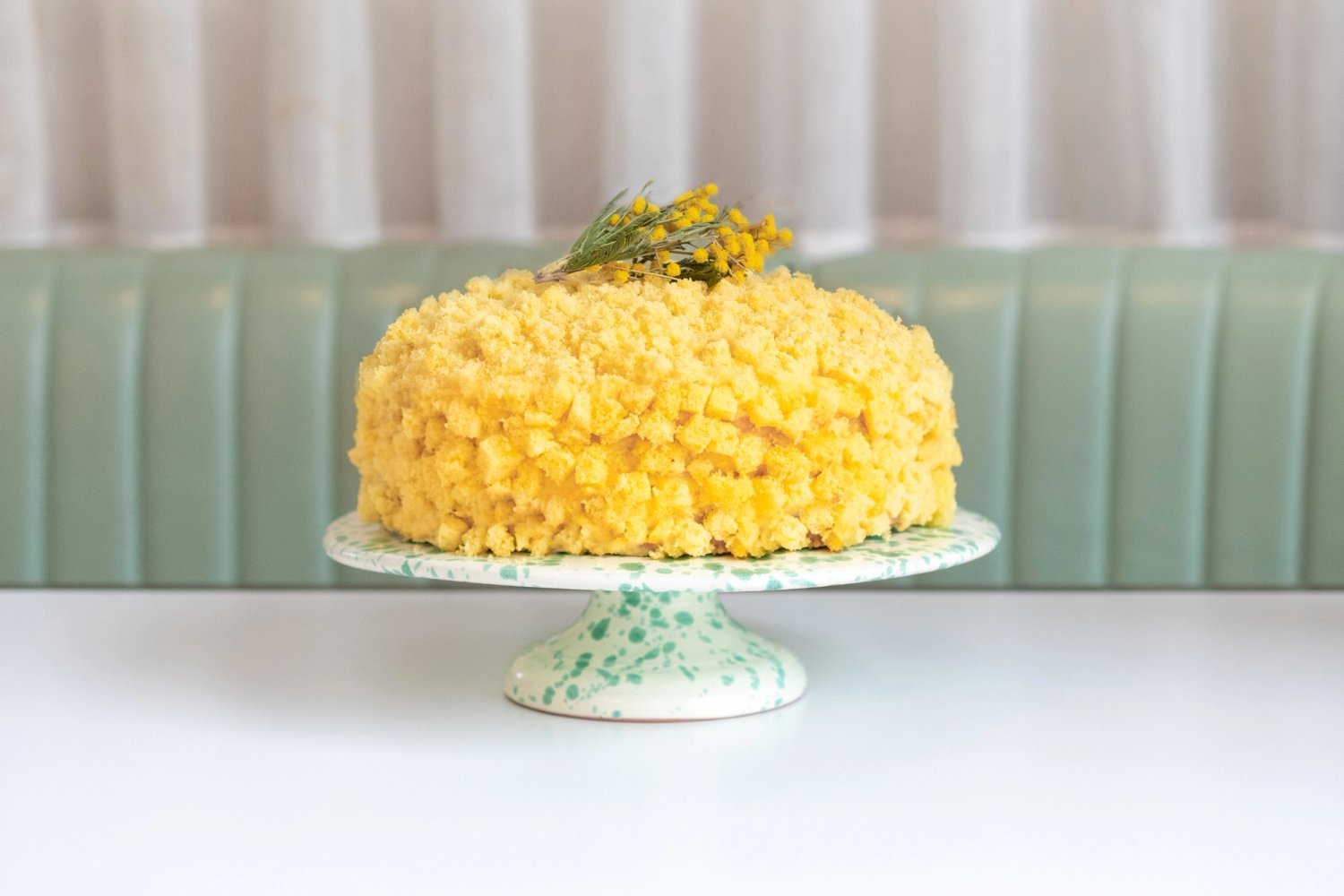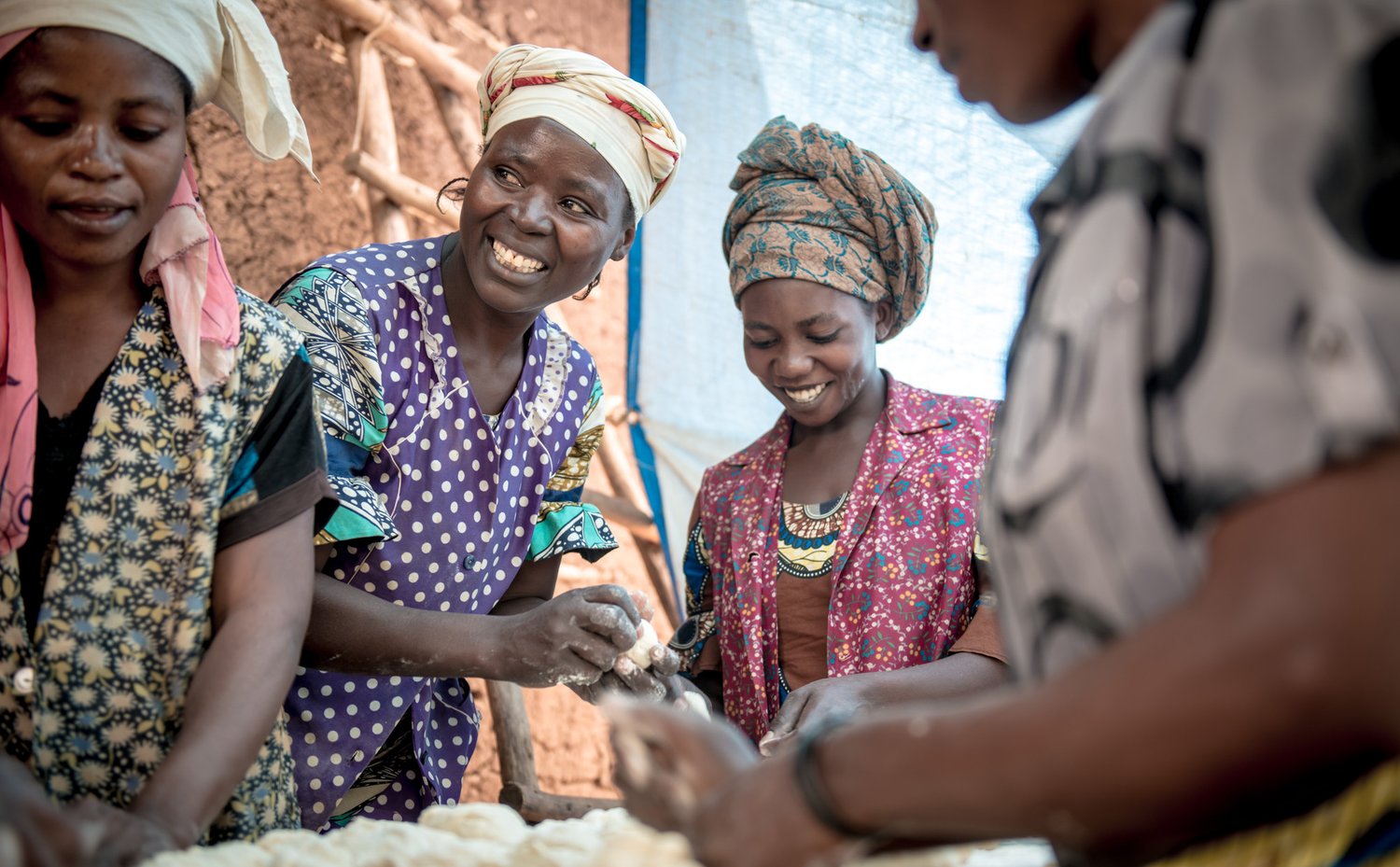News
In Conversation with Sara Bowcutt from WfWI
Once again, we are honoured to partner with the incredible Women for Women International, an organisation dedicated to empowering women survivors of war and conflict. This year, their inspiring #SheDares campaign shines a light on the courageous women defying social norms and daring to lead movements for change in their communities.
To delve deeper into their mission, impact, success stories, and vision for the future, we interviewed Sara Bowcutt, the UK Managing Director of Women for Women International. Sara shared insights into the organisation's transformative work rebuilding lives, fostering leadership, and driving sustainable change for women, their families, and communities. She also reflected on her personal experiences and the challenges of creating lasting progress while working with the UK team.
Can you tell us a little about the mission and work of Women for Women International?
Women for Women International invests where inequality is greatest by helping women who are forgotten — the women survivors of war and conflict.
We were founded in 1993 to support women who had endured violence and rape during the Bosnian War. Since then, our global community has invested in the power of over 583,700 women across 17 conflict-affected countries, from Afghanistan to Iraq, South Sudan, Nigeria, the Democratic Republic of the Congo and more.
Our vision is to create a world in which all women determine the course of their lives and reach their full potential.
Who are the women that WfWI supports, and what are their stories?
Women for Women International invests in women survivors of war. We reach women who are too often left behind, silenced or ignored – those who struggle with poverty and violence, who have been denied basic education and healthcare and who suffer greatly from conflict and instability. The women we serve tell us that through our programmes, they find new opportunities to strengthen themselves, their families and their communities.
In honour of Women’s History Month, we are celebrating women in our programmes who are paving the way for a brighter future and shaping history today – women who are standing up when their rights are on the line, even in the world’s most dangerous places.
Sohaila is one of these women. She lives in Afghanistan, where the de facto government has been rolling back progress on women’s rights since they took back control of the country in August 2021. This is a country where 95% of people do not have enough to eat – a statistic that rises to almost 100% in women-headed households (source: UN) and where 94% of widows are illiterate (source: Afghanistan Ministry of Social Affairs, Labor, Martyrs and Disabled). And yet, when Sohaila lost her husband, she told us: “Culturally, as a widow, it was expected of me to withdraw from public life and rely on the support of my extended family. However, I was determined to take a different path to provide for my children”.
Despite the odds, Sohaila joined our programme and has since dared to find work and open up a shop, making her one of the 2% of women business owners in Afghanistan (World Bank). She has completely transformed her life. She shared: “my children are back in school, and I have built a new house for my family … My success challenges entrenched perceptions about the capabilities of women and widows to take charge of their households. I dared to break societal norms and pursue an unconventional path that has led to my success.”

How does WfWI specifically support women survivors of war and conflict in rebuilding their lives?
Through our core Stronger Women, Stronger Nations Programme, we invest in women gaining the knowledge, skills and resources to increase their social and economic power. Women come together in groups of 25 and form deep connections with each other – so much so, that many say they graduate feeling like sisters. Their bonds help them to begin to heal, finding acceptance among those with similar experiences, breaking down the isolation and loneliness war often causes, and lifting each other up as they take steps to rebuild their lives. Together, they train in vocational and business skills to earn an income, start savings groups, and learn health and wellness information to care for themselves and their families and to defend their rights.
Women for Women International also works with partner organisations where crises are erupting or escalating so that we can meet the needs of women on the ground as they arise. From Ukraine to Syria, Myanmar, Palestine and other conflict-affected regions, we offer urgent women-centred support, no matter what side of the conflict they’re on.
In my time here, I have seen firsthand how women use their power to drive change. Our work invests in the most marginalised, forgotten women and supports them to raise their voices and rebuild their lives, support their families and strengthen their communities.
What are some of the most common challenges faced by women in these situations, and how does WfWI address them?
The women we serve have faced myriad forms of violence, poverty and inequality. More than half of the women in our programmes are illiterate, all earn less than $1.25 a day before enrolling in our programme and many are widows, refugees and/or survivors of rape and abuse.
Despite these stark disadvantages, they are instrumental in caring for and providing for their families at times of crisis, often stepping outside traditional domestic roles in order to survive. Many become sole breadwinners for their families after the loss of husbands and male relatives, and are struggling against the odds to both care and provide for their families. This is a near-impossible task in the backdrop of trauma, grief and a lifetime of discrimination.
We bring women together in groups of 25 to help form support networks and break down the isolation and loneliness caused by war. In our Stronger Women, Stronger Nations programme, we teach them to understand and defend their rights, so that they can protect themselves and advocate for other women and girls in their communities. In South Sudan, for example, our programme evaluation shows that in 2022, awareness about violence against women and human rights increased from 23% to 97%, from enrolment to graduation. And when asked if they’d ever spoken out publicly against violence against women, results from enrolment to graduation increased from 2% to 41% in South Sudan.
Together, women in our programme also learn to make and save money, and about their physical and emotional health, so that they can support themselves and their families. Our 2022 programme data showed that on average, globally, 20% of women we served were saving a portion of personal or household earnings before enrolment – and after graduation this was up to 79%. By contributing to their household income, we see women and their families eating better, a decrease in domestic violence and an improvement in women’s confidence, mental health and decision-making power.
We also work with men so they can join as allies and advocates for gender equality. We engage male family members of the women we serve, as well as male community leaders, to accept women as earners and providers in the home.
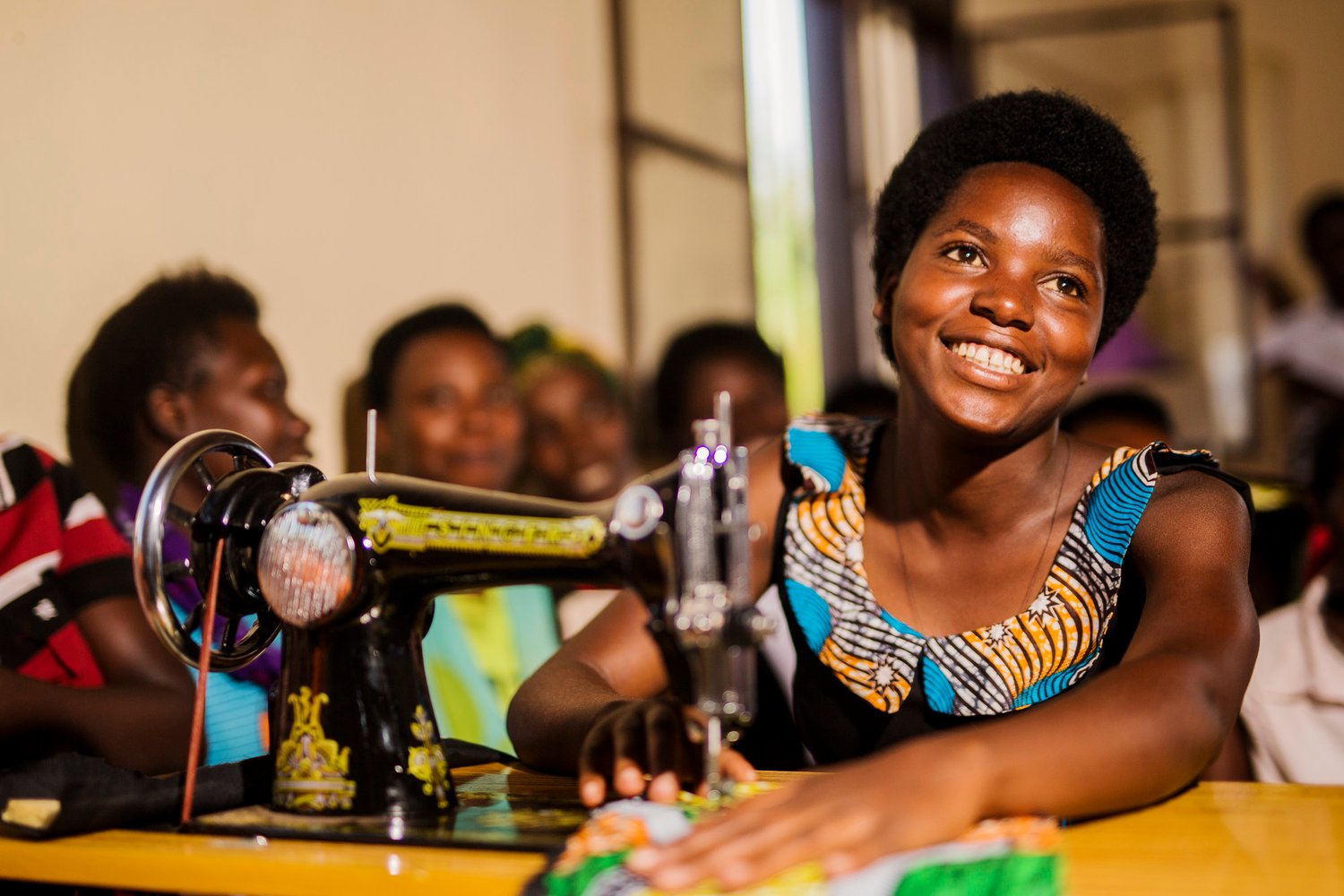
How has WfWI's work evolved over the years and adapted to changing global issues and conflicts?
I wish the need had dwindled, but sadly there are 27 armed conflicts raging on worldwide (source: Global Conflict Tracker) and women are still facing horrific violence and discrimination.
We expanded from Bosnia and Herzegovina in 1993 to Rwanda in 1994, and now work in 17 conflict-affected countries. We have offices in nine – most recently, in Palestine. In these countries we run our core Stronger Women, Stronger Nations programming, adapted in each region to suit the need and context. We also run complementary programming – which has developed as women have asked for additional support and identified needs in their communities. After years of working solely with women, women we served told us we needed to go a step further. They asked us to educate the men in their communities about women’s rights. In response, we started a Men's Engagement Programme in Nigeria in 2002. Since then, we have worked with 50,894 men in six countries to ensure they become supporters of women's empowerment instead of barriers. And when women learning about their rights wanted to learn deeper advocacy and leadership skills so they could better advocate to community leaders, our Change Agent programme was born in 2017.
In 2018, seeing so many conflicts worldwide beyond where we have offices, we launched the Conflict Response Fund. This now allows us to work in other places through local partner organisations. This Fund means that we can act quickly and invest in women in emerging conflict zones around the world – including Syria, Ukraine, Myanmar, Burkina Faso, Mali and others. Through a non-partisan approach, we track crises in real time, identify credible partners on the ground and allocate resources to meet the urgent needs of women survivors.
And most recently, we have adapted our tried and tested Stronger Women, Stronger Nations programme to reach under 18s. Adolescence is the ideal point to leverage development and empowerment programmes – a moment where long-term decisions lead to life-long impact. We have been seeing a growing need to support and engage under 18s, so it was a very proud moment to see this new programme launch during my visit to Rwanda, where it’s piloting. The programme includes self-love and self-esteem, numeracy training, managing complex emotions like anger and stress, healthy relationships and different forms of power, and much more. It will also provide opportunities for the girls to hear from women who’ve graduated our core programme, who will share their learnings and advice. This launched at the end of last year, and the excitement among the team in Rwanda was tangible!
Can you share any success stories or impacts that WfWI has had on women and communities around the world?
Since 1993, we have reached over 583,700 women survivors of war and conflict. These women have gained skills, confidence and strength among their sisters on our programme. They have worked hard to start rebuilding their lives and tell us about how our trainings have helped them increase their household income, protect girls in their communities from abuse, feed their children more nutritious meals, have greater influence over family planning and other critical conversations in the home – and so much more. We also know that these women pass their knowledge on to other women and to their children, creating a ripple effect of change for generations.
Each woman has her own story, but I’d like to share something one woman, Marie Jeanne in the Democratic Republic of the Congo, shared recently:
“The training gave us a safe space to share our experiences and speak up on issues affecting us in our communities and homes … Due to many years of conflict in the Democratic Republic of the Congo, retrogressive traditional social orders have been deeply rooted in our society. I realised that women could not speak or share their concerns during public assemblies in my village. All decision-making processes are still concentrated in the hands of men alone. I took a stand and decided to go against the norm. I am representing and speaking up on behalf of women in the assemblies. I am making the voices of women heard in my village. Some of the issues I am speaking up about with the local authority in my village are women's inheritance, girls' education, women's economic power, sexual violence against women and girls, and women's ability to speak out and express their ideas. The local authority has picked up on and addressed some of the issues … As of now, I have assisted three women in my village to get back their inheritance after they were unlawfully denied their right to inherit since they are women. My efforts are not just in the changes I instigated but in the courage I sparked in the women in my village. I am hopeful that one day, my fearless voice will shatter all the barriers and bring a new era of equality to my village.”
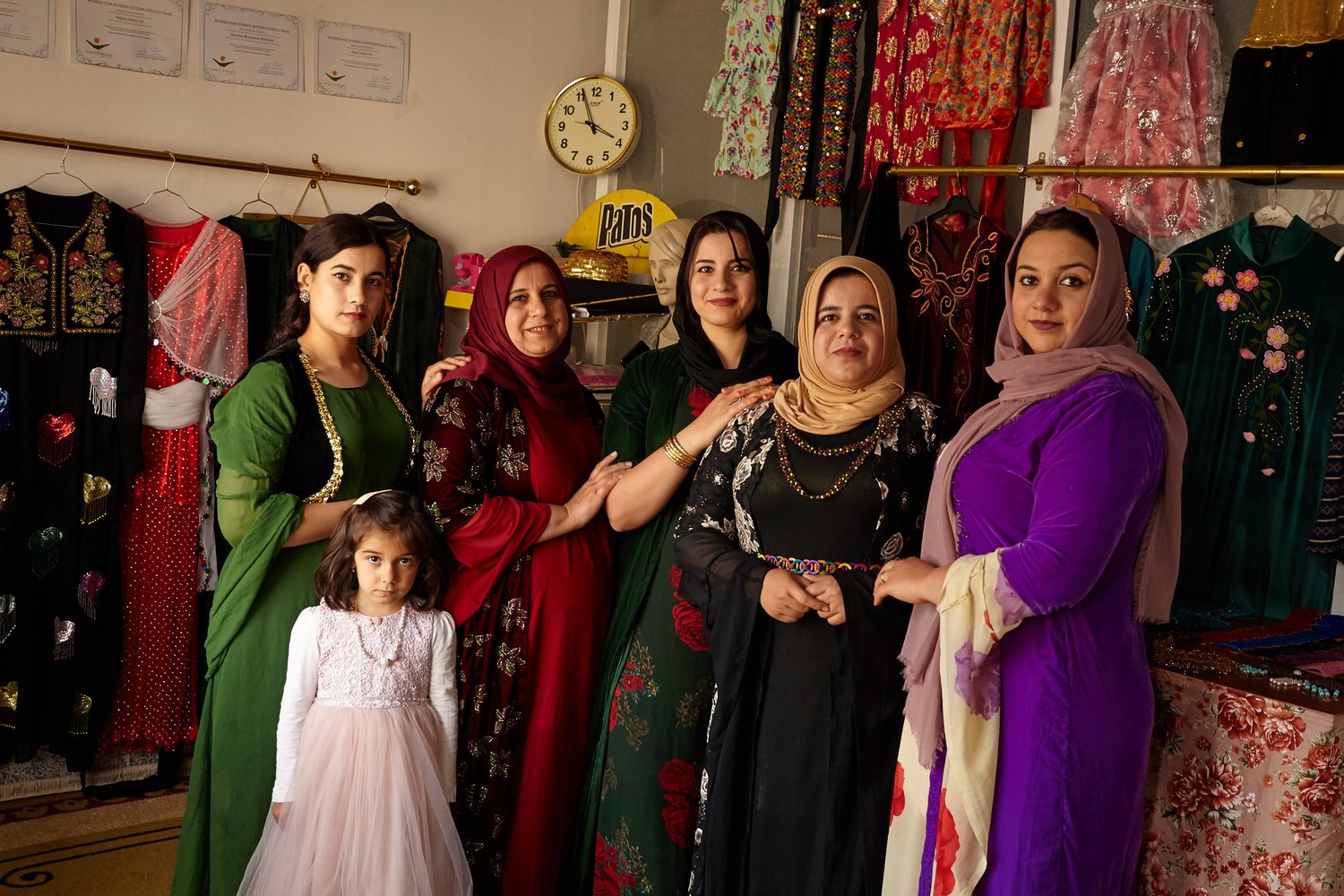
Do you have a personal memory related to a specific case that you can share? For instance, a story about a woman whom WfWI directly assisted.
In December, I was lucky enough to return to Rwanda. During this trip, I spent a week visiting Women for Women International’s programmes and meeting so many women currently going through our Strong Women Stronger Nations programme or graduates of it.
One (of many) highlights was meeting women who have taken on leadership roles as a result of being in our programmes. As a female leader myself I know how challenging this can be and how important it is to have female voices included in decision-making. It was wonderful to meet so many other female leaders on our trip – and learn a thing or two from them about leadership.
Many co-operative groups we met all had strong, confident leaders who stood up and presented their work, told us proudly how they’d used skills learnt on our programme to develop their ideas, business plans and dreams, asked us questions and just completely owned the room. One woman really stood out though – after her Village Savings and Loans Association group (VSLA) had shown us how they use a new digital app to track their savings, she pulled me aside to tell me that after she graduated she was so changed and confident in herself that she started doing more in the local community, suggesting changes and improvements to things – and that now she is the leader of her village. For me, it was a powerful and moving reminder from small steps and a bit of confidence major change can, and does, come.
What are some ways in which individuals can support and get involved with WFWI's mission?
This March, in honour of Women’s History Month and International Women’s Day, you can get involved with our #SheDares campaign. We are celebrating women who dare to stand up when their rights are on the line and who are driving progress towards gender equality forward, even in the world’s most dangerous places.
Download our free Women’s History Month Calendar with resources, actions and events for every day of March – and share it on your platforms to inspire others, too! Follow us, tag @WomenforWomenUK and use #SheDares.
You can also stand with women survivors of war year-round by making a monthly gift. You’ll help us enrol more women on our programmes and adapt quickly as crises evolve. No matter how big or small, your support really will help women rebuild their lives. Learn more and donate here.
Can you talk about any upcoming projects or initiatives that WFWI is currently working on or planning for the future?
We’re evolving our sponsorship programme to help us reach even more women survivors of war and conflict. Whether you choose to stand with one woman survivor of war as she completes our Stronger Women, Stronger Nations programme, or make a monthly gift to support a classroom, I hope you’ll join us. Explore our giving programme and make an impact today.
How does the partnership with Lina Stores contribute to WFWI's goals, and what are some of the tangible results of our collaboration?
Last year, in 2023, Lina Stores raised over £9,000 to support women survivors of war. This helped us reach over 30,350 women, which we are so grateful for. This March, Lina Stores is sharing cards about our work with each bill and using their platform to amplify our work on social media, helping to raise awareness and the voices of women affected by conflict.
We could not do this work without partners like Lina Stores and our wider global community. As a food business, this partnership is also a fantastic way for us to highlight the importance of nutrition – a key element of our Stronger Women, Stronger Nations programme.
Women in our programme learn about ways to introduce a more balanced diet into their homes, like Donata who shared: “I am glad I learned about nutrition so I can prepare better food. I also started a kitchen garden where I’ve planted spinach because I learned it is good for my children”. Many also set up small food businesses, from beekeeping to jam cooperatives, which helps them to support themselves and their families financially.
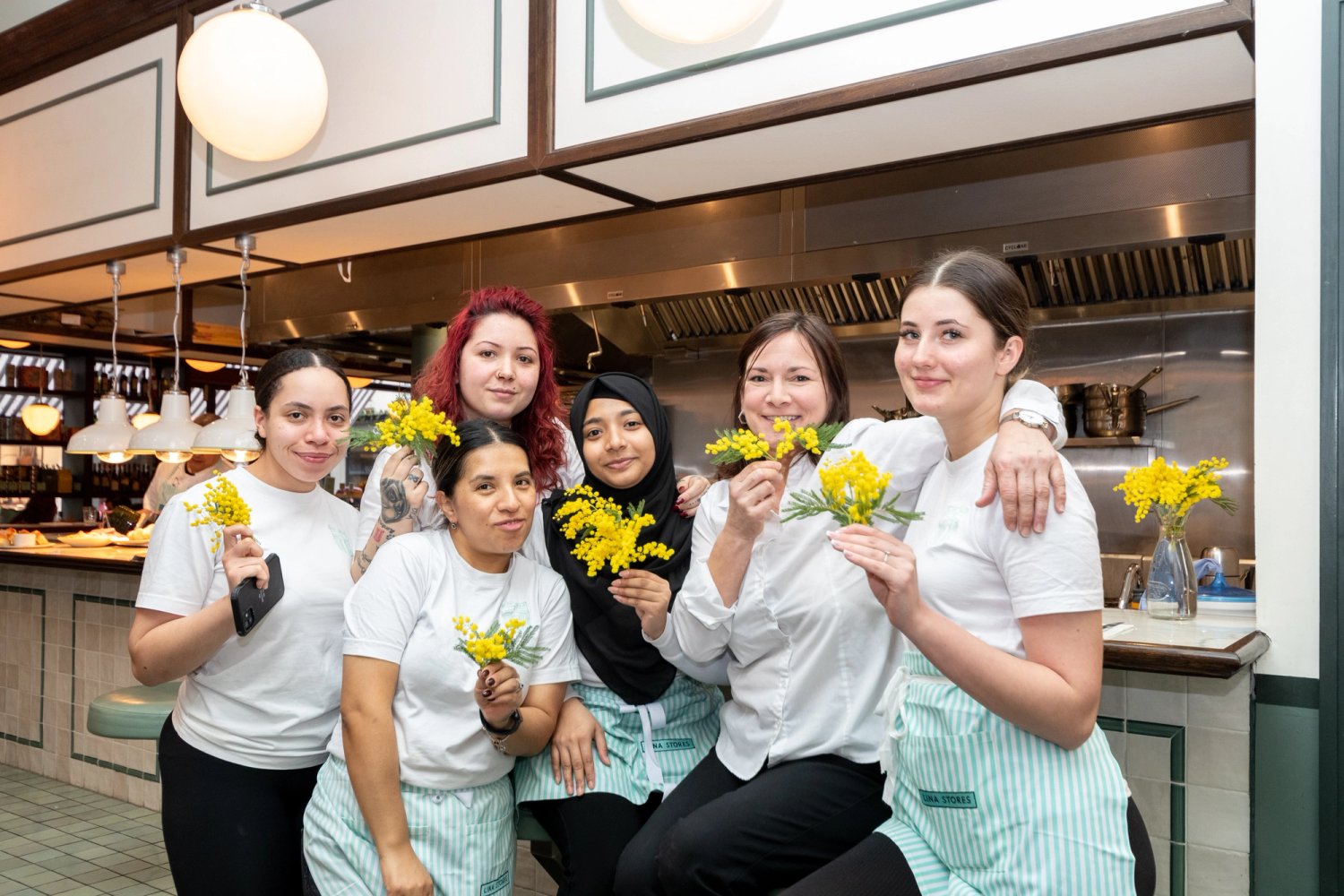
Finally, can you tell us a bit about your personal experience working with WFWI and how it has impacted you? Overall, what has been the most rewarding part of your role as UK Managing Director?
I’ve been with Women for Women International for 7 years now and I would say it is a constant learning experience. Whether that is learning from the women we serve about what they need and how they implement the learning from our programmes or about the long-term impact war, insecurity, violence and isolation has on people to learning about the power my own voice has – it's been a journey. As a female leader I’ve also learnt so much as Managing Director particularly about feminist leadership principles and that collaboration is more important (and impactful) than standing on your own.
Over the last few years, I feel like every time I speak about our work I have to address a new, emerging or continued conflict and how women are affected by them. And today is no different. Our news feeds, social media, our conversations with friends and family are often full of the horrors of war. That can be draining and emotionally difficult but one thing I have learnt is that the power and resilience of women is undeniable, and I choose to focus on hope – the hope that women bring to themselves, their families and communities when conflict strikes. I also choose to focus on what a privilege it is to do this work and to help women affected by war tell their stories and raise their voices higher.
The best parts of my job are the incredible team I get to work with in the UK and across the world and meeting the women we serve. When I was in Rwanda recently I was able to see the full spectrum of change that can happen from the early days of our programme, to a few months after graduation to 10 years after. I was privileged to meet women at every stage of this journey and it blew me away. One women’s cooperative group I met are harvesting and selling coffee beans. They’re successfully running their business but won’t stop here and told me that they have even bigger dreams. First to save enough to buy and run their own washing station so they can process the coffee beans themselves to increase profit. And secondly, they dream of one day exporting their coffee internationally. What can be more rewarding and hopeful than that?
Celebrating Festa Della Donna at Lina Stores
To celebrate Women’s History Month, we are proudly supporting Women for Women International throughout March by adding an optional £1 donation to every restaurant bill and by donating £1 from every Mimosa cake sold in our delicatessens.
The Mimosa cake, given its name for its resemblance to the flower, is a yellow sponge cake traditionally on display in many Italian bakeries on the days leading up to the celebration. Our homemade Mimosa cake is now available in all our delicatessens and as a special in our King's Cross and Marylebone restaurants until the end of March.
Click on the button below to discover how we're celebrating Festa Della Donna in our restaurants and delicatessens this month and to learn more about Italian Easter traditions.
